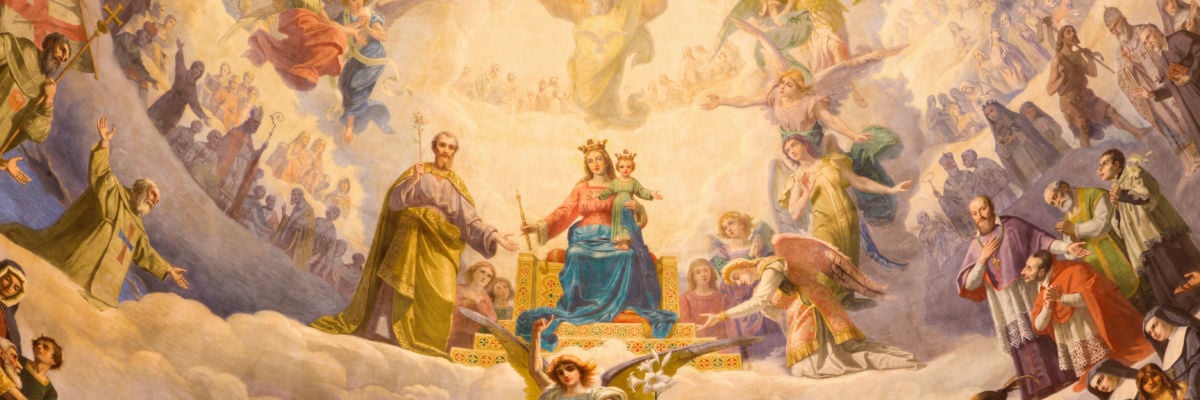
Karlo Broussard helps a caller who asks if a prayer written by St. Alphonsus Liguori takes honoring Mary too far.
Transcript (Auto-generated):
Sure, I’ll do my best to be respectful to my question. I’m a Protestant.
So I just wanna first establish one thing I’ve common ground before I ask a question because it’s involved.(…) From what I understand, St. Thomas Aquinas lays out three different kinds of veneration in the church. One is veneration due to saints. One is a special veneration due to Mary. And lastly, there’s a special kind of worship due to God alone.
Now, I was reading online from one of the doctors of the church, I think the same, I might get it wrong. Father Alfonso de Gori.
Yeah. A devotional called Glories of Mary.
my question is, I’m not contesting praise of saints right now. My question is, in that book, which seems like it would be an acceptable, regular part of marrying devotion from the Catholic Church, it seems to me that the powers that belong to God alone, such as to prevent one from falling into sin, to guide one into salvation,
to protect, to guide in that way, those are powers I would expect God to have. And while I do think the Bible commands us to venerate Mary, call her blessed, she expects that.
It seems to me that we cross into that special worship that belongs to God alone, as laid out by St. Thomas Aquinas,
when we ascribe those powers to Mary. So I’d like to know what you think of that.
All right, so you brought up some powers being ascribed to Mary. And so the conclusion is, because these powers are ascribed to Mary, therefore this would entail idolatry or worship, or the veneration that belongs to God alone. So I would just challenge that inference. So you brought up two things here. You spoke of preventing one from falling into sin. And I’m assuming that this is what St. Alphonsus is saying in the glories of Mary,
Mary preventing us from falling into sin, protecting and guiding us in the journey of salvation. Okay, so here’s the key Warren, for us as Catholics,
whenever we say something like that, we understand we’re actually using sort of underpinning all this as the Thomistic distinction between primary and secondary causality, okay? So consider this, if you go out and you preach the gospel to someone, all right, like Paul does, and somebody responds to that preaching of the gospel and they repent and they believe in the gospel and they’re quote unquote saved.
You can legitimately say with St. Paul, I have saved some. St. Paul says that at 1 Corinthians 9, I think it’s 22 verse through 23, I become all things to all men that I might save some.(…) But whenever we would say that, and when Paul says that, we understand that the source of the salvation is not coming through the preacher,(…) that the preacher is simply in a secondary cause of bringing about that blessing for the person which God ultimately gives that grace. But nevertheless, we acknowledge that in God’s providence, Warren, God will to use that preacher to bring about salvation for that person.(…) And so the same is true for any sort of poetic language,(…) and within pious devotions of the saints in reference to Mary, saying Mary, or asking Mary, prevent us from falling into sin, help us not to fall into sin. Well, I think Warren, you would agree with me perhaps that I could ask you to help me not fall into sin by being a good brother, holding me accountable, let’s have meetings once a week, let’s get together once a week. And by doing that and having conversations and praying with me, you’re helping me by you’re helping me to not fall into sin, you’re strengthening me and God wills to use you as an instrument to bring about that blessing in my life. And that’s how we understand this sort of language applied to Mary, not that she’s the primary cause of our salvation, only God has the power to save us. But we recognize that God wills to use Mary in all members of the mystical body of Christ as instruments or secondary causes to actually bring about certain blessings and effects within our lives, such as protection from sin and guidance in the journey of salvation. So you can guide me in the journey of salvation by teaching me the word of God, by exegeting scripture for me, by counseling me with spiritual wisdom as to which behaviors I should avoid and which behaviors I should do as a Christian,
that would be serving me as a guide in my journey of salvation in my relationship with the Lord. And that’s simply the way that we as Catholics view Mary’s protection and guidance in our salvation, recognizing that God wills to use her as a secondary cause again, to bring about these blessings in our lives. Could God do it all by himself? Absolutely. But God has revealed to us in this order of providence that he wills to use other human beings as instruments to raise them to a high level of dignity to be participants in the providential order, the providential plan of God, where God, the divine governor, leading all things to their appropriate goal or in union with him, God wills to use human beings to participate in that governance to help people to achieve their goal, which is union with God. And of course union with God in this case would be protection from falling from sin to sin, protection and guidance in salvation. So I would simply challenge the assumption that these sorts of activities belong to God alone. Yes, God is the source of them, but that doesn’t mean God can’t use members of the mystical body of Christ, such as the saints in heaven, you and me, as instruments or secondary causes to bring about these blessings. So what do you think of that, Warren?
I think what you said is reasonable and could very well be true. Could I ask one quick followup? Sure, go ahead. Yeah, sure, yeah. Okay, so let’s say everything you said is true and right. Then my question to you would be this.
If we grant those premises you’ve said, what would it look like for worship of marriage to cross into that threshold?
If we say that everything you’ve said,(…) like that’s true, but what would it look like hypothetically?
Yeah, well, one thing you asked, what would it look like so visibly? It would be any sort of offering sacrifice to Mary and thinking that in virtue of that sacrifice offered to Mary that you would be freed from sin and protected from sin and guided and granted salvation on account of the sacrifice offered to Mary and on account of that act of worship. Because we understand sacrifice essentially(…) to be an act of worship that belongs to God alone. That’s the honor for the Creator. So that’s what it would look like, right? But also we could take into account one’s intention. So if somebody interiorly, as I mentioned before on the broadcast, if somebody interiorly approaches Mary in their devotional pious actions(…) and thinks that Mary is the source of the forgiveness of sins, or Mary is the source of preventing us from falling into sin. And that sort of devotion is to her alone and taking away and precluding the person from going to Jesus for forgiveness of sins and looking to him as the source of salvation.
You might not have a visible looking, right? A seeing or a visible,(…) what it looks like, but at least interiorly, that would be putting Mary in the place of Jesus. And that is forbidden by Catholic teaching. We would reject that. We would say that is indeed a worship or an act of worship that, interior act of worship that belongs to God alone because only God is the source of the forgiveness of sins and the source of our salvation.
Mary is simple. Our view is that Mary, and this must be the interior act of the will as well, approaching her with the understanding that God has will to use her as a conduit, as an instrument, as a secondary cause to bestow certain self-defect blessings in our lives through her intercessory prayer.
Okay. It’s kind of like this. So Warren, think about this, brother. You called me on the radio show. Did God need me to give you the answer to those questions? Absolutely not, right? God doesn’t need Catholic answers to infuse truth within your intellect. But yet you still call because you recognize the prior assumption is that God has set things up in such a way that he wills for us to communicate, at least in this case, the blessing of truth to each other. God wills to use us, and you will to use the apostles. And so too, when it comes from to protection, from falling into sin, guidance in our journey of salvation, God wills to use Mary and the saints in heaven, as well as us here on earth.



